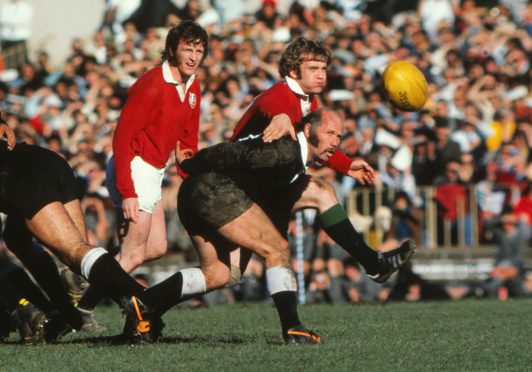Douglas Morgan, one of the few men ever to play for, captain and coach Scotland, has died in Edinburgh after a long illness at the age of 73.
Morgan, who also played in two tests for the British Lions on their tour of New Zealand in 1977, played 21 times for his country and skippered the team during the 1978 Five Nations season.
He went on to coach Scotland from 1993 through to the end of the Rugby World Cup in 1995, and also served as team manager for three years from 2000.
A goal-kicking scrum-half, Morgan played for Melville College in Edinburgh and won his first caps after the amalgamation with Daniel Stewart’s to form the Stewarts Melville FP club that still plays at Inverleith.
He made a winning debut against Wales at Murrayfield in 1973 up against the great Gareth Edwards, kicking a conversion of half-back partner Colin Telfer’s try as Scotland edged a Lions-laden Welsh side 10-9.
Two weeks later he kicked two penalties and two drop goals as Scotland beat Ireland, and over the next five years he and Heriot’s Alan Lawson had a long battle for the Scotland 9 jersey.
Morgan played in another famous victory over the Welsh at Murrayfield in 1975, kicking three penalties as the Scots won 12-10 in front of a then-record crowd for a rugby international of an estimated 105,000.
He was selected to tour New Zealand with the British Lions in 1977 but coach John Dawes preferred the uncapped Welsh scrum-half Brynmor Williams for the first three tests.
An injury to Williams in the third test saw Morgan replace him and he started the fourth and decisive test in Auckland, scoring all the Lions’ points with a try, conversion and penalty only to see Lawrie Knight’s late try for the All Blacks deny the Lions a shared series.
Morgan’s only season as captain in the 1978 Five Nations saw the Scots defeated in all four games, after which he retired and entered coaching, serving with Stewarts Melville and Edinburgh District before joining the national team coaching panel just before the 1990 Grand Slam.
He took over as Scotland head coach in 1993, with mixed results until 1995 when the Scots won in Paris for the first time since 1969 and went to Twickenham at the end of the championship with a Grand Slam as the prize.
The Scots lost that game to England 24-12, and after the World Cup campaign in South Africa in 1995, when the team went out at the quarter-final stage to New Zealand, Morgan stepped down.
He stayed in the international arena as team manager for the Scotland A and Sevens set-ups before taking over the role for three years from 2000.
A chiropodist to trade, Morgan’s son-in-law Graham Shiel also went on to play for Scotland and his grandson Charlie is currently a scrum-half with Edinburgh.
Sir Ian McGeechan, a friend and team-mate of Morgan’s for many years, described him as “a hugely competitive and a talented sportsman”.
“Dougie had a deep understanding of the game and was tactically very aware. I will never forget him standing on Gareth Edwards’ foot to distract him whilst trying to put the ball into the scrum, an approach which stopped Wales playing and we ultimately won the game. He was also a natural goal kicker.
“His support was never better than with Jim Telfer, Derek Grant and myself we had a coaching group which shared ideas, particularly in the build up to the Rugby World Cup in 1991.
“On and off the field he was a great friend and companion. I have memories I will always cherish and be very thankful for knowing Dougie.”
Current Scotland head coach Gregor Townsend described Morgan as “a great servant to Scottish rugby, first and foremost as a terrific player and captain of the national side.”
“He went on to have success as a coach, in 1995 we came very close to winning a Grand Slam and a few months later his Scotland team were only seconds away from topping their pool in the World Cup until France scored deep into injury time,” recalled Townsend.
“Dougie was a hugely popular figure in his time as manager of the national team. He has contributed a huge amount to Scottish rugby and he’ll be sorely missed.”


